Fredericka Carolyn "Fredi" Washington
DOB - December 23, 1903 - Savannah, Georgia, U.S.
DOD - June 28, 1994 (aged 90) - Stamford, Connecticut, U.S.
Occupation - Actress, activist, writer
Spouse(s) - Lawrence Brown (divorced)
Anthony Bell, DDS (his death)
For Black America, she was the "black girl who looked white" or "the girl with a boy's name".
Fredi helped find the Negro Actors Guild
with sister Isabel and Isabel's husband Adam Clayton Powell, Jr.
Friends like Bobby Short and her sister’s husband, Congressman Adam Clayton Powell said that she never hid behind the lightness of her complexion. Short also says Fredi told him that she was interested in meeting Donald Bogle, which did eventually happen.
Washington’s commitment to civil rights was just as strong as her professionalism in the theater and cinema arts. She was one of the founders of the Negro Actors Guild and from 1937 to 1938 was the organization’s secretary. She was administrative secretary for the Joint Actors Equity-Theater League Committee on Hotel Accommodations for Negro Actors throughout the United States.
Washington was on radio in the Jewish immigrant comedy The Goldbergs, and performed specials for the National Urban League on CBS radio. In 1952, she married Anthony Bell, a dentist, and was inducted into the Black Filmmakers Hall of Fame in 1975. Fredi Washington died on June 28, 1994.
Fredi was said to have piecing Blue Green Eyes that could look right through you.
Millionaire Wall Street financier Otto Kahn openly entranced ------- and told Fredi "You could easily be French." Urging her to change her name to a French one, he said he'd pay for her dramatic education at the Theatre Guild School, but Fredi exclaimed " But I want to be who I am, nothing else."
Some of her favorite actresses were Dorothy Dandridge, Nina Mae McKinney and Helen Humes.
Imitation of Life (1934)
Actress, Maude Russell on Fredi, "she looked like white. She had skin like Dresden China and had blue eyes."

Fredi Washington was born in Savannah, Georgia to Hattie and Robert T. Washington, an African-American couple. Fredi was the second of their five children. Her mother, Hattie, died when Fredi was a girl.
Fredi (1st on left) Isabel (3rd from left)
As the oldest girl in her family, Fredi helped raise her younger siblings, Isabel, Rosebud and Robert, with the help of their grandmother, whom the family called "Big Mama." After their mother's death, Fredi was sent away to a school for colored girls in Philadelphia. At this time, motherless girls were thought of as orphans, despite other family. Her sister, Isabel, soon followed her. At some point her father, Robert T. Washington, remarried. His second wife died while pregnant. He later married a third time and had four children with his last wife. Fredi had a total of eight siblings from her father's two families. While Fredi was still in school in Philadelphia, her family moved North to Harlem, New York in the Great Migration for work and opportunity in the industrial North. Fredi followed her family to Harlem. She quit school soon after to help provide financially for the family.
Washington started her career as a dancer in the Broadway play, Shuffle Along. She was in a few of the first black Broadway shows. Because of her beauty and talent, she easily moved up as a popular featured dancer. She toured internationally with a dance team. During this period she befriended many African-American performers, including the dancer Josephine Baker.
She became known as an actress, and had an important role in a 1943 radio tribute to black women, "Heroines in Bronze", but was best known for her work in film. Her first movie role was in Black and Tan (1929), in which she played a dying dancer. She had a small part in The Emperor Jones (1933) starring Paul Robeson, based on the play by Eugene O'Neill. In Imitation of Life, Washington played a young mulatto who chose to pass as white to seek more opportunities in a society restricted by legal racial discrimination in some states and social discrimination in others. The film was nominated for an Academy Award. In 2007, Time magazine ranked it as among "The 25 Most Important Films on Race".
Washington dated Duke Ellington for a while but, realizing he was not going to marry her, she started another relationship. She married Lawrence Brown, the trombonist in Ellington's jazz orchestra, a relationship which ended in divorce.
Washington later married Anthony H. Bell, a dentist. Bell died in the 1980s. Washington died after a series of strokes on June 28, 1994 in Stamford, Connecticut, aged 90. According to her sister, Isabel, Fredi never had children. One of Washington's sisters, Isabel Washington (May 23, 1909 – May 1, 2008), was a singer and nightclub performer. She married Adam Clayton Powell, Jr., the first African American elected to Congress from New York state. They later divorced. At her death, Washington was survived by her sisters Isabel Washington, Rosebud Smith and Gertrude Penna, and a brother, Floyd Washington.
Fredi with sister Isabel
Throughout her life, Washington was often asked if she ever wanted to "pass" for white. Washington, a proud black woman, answered conclusively, "No." She said this repeatedly, "I don't want to pass because I can't stand insincerities and shams. I am just as much Negro as any of the others identified with the race."
"I have never tried to pass for white and never had any desire, I am proud of my race. In 'Imitation of Life', I was showing how a girl might feel under the circumstances but I am not showing how I felt."
"I am an American citizen and by God, we all have inalienable rights and wherever those rights are tampered with, there is nothing left to do but fight...and I fight. How many people do you think there are in this country who do not have mixed blood, there's very few if any, what makes us who we are, are our culture and experience. No matter how white I look, on the inside I feel black. There are many whites who are mixed blood, but still go by white, why such a big deal if I go as Negro, because people can't believe that I am proud to be a Negro and not white. To prove I don't buy white superiority I chose to be a Negro."
Washington turned down a number of chances to pass for white as an actress, which might have led to more acting roles.
In 1945 she said:"You see I'm a mighty proud gal and I can't for the life of me, find any valid reason why anyone should lie about their origin or anything else for that matter. Frankly, I do not ascribe to the stupid theory of white supremacy and to try to hide the fact that I am a Negro for economic or any other reasons, if I do I would be agreeing to be a Negro makes me inferior and that I have swallowed whole hog all of the propaganda dished out by our fascist-minded white citizens."
(w/ Ethel Waters)
Because of her beauty and appearance, directors often chose darker-skinned actresses for the stereotypical "maid" roles offered to black actresses in those years. As the film production code prohibited suggestions of miscegenation, Hollywood directors did not offer her romantic roles with leading white actors. She had a role (4th billing) in Fox's One Mile from Heaven (1937), in which she played a mulatto claiming to be the mother of a "white" baby, a story uncovered by Claire Trevor as a reporter. She helps both Washington and the biological mother, played by Sally Blane, a white woman who gave up her baby and was paired with Bill Robinson. The Museum of Modern Art has described it in 2013 as "The last of the six Claire Trevor “snappy” vehicles Dwan made for Fox in the 1930s tests the limits of free expression on race in Hollywood while sometimes straining credulity."
Dorothy was Fredi's favourite actress!
Washington was also a theatre writer. She was the Entertainment Editor for People's Voice, a newspaper for African Americans founded by Adam Clayton Powell, Jr., a Baptist minister and politician in New York City. For a time he was married to her sister Isabel Washington. It was published 1942-1948. She was outspoken about racism faced by African Americans. She worked closely with Walter White, then president of the NAACP, to address pressing issues facing black people in America. Her experiences in the film industry and theatre led her to become a civil rights activist. Together with Noble Sissle, W.C. Handy and Dick Campbell, in 1937 Washington was a founding member with Alan Corelli of the Negro Actors Guild of America (NAG) in New York.
In 1953, she was a film casting consultant for Carmen Jones, which starred Dorothy Dandridge, another pioneering African-American actress. She also consulted on casting for George Gershwin's Porgy and Bess, an opera performed in revival on Broadway in 1952, and filmed in 1959.
The love of her life was Duke Ellington according to her sister Isabel. Drawn to his looks and intelligence, his talent and sophistication, as he no doubt was attracted to the same characteristics in her. Fredi had a discreet but passionate affair with him. Yet her hopes that he would leave his wife never materialized. Singer, Alberta Hunter said that Fredi left the country to get over Duke.
Lawrence Brown, the trombonist, first husband. Fredi married Brown a member of Duke's band in 1933. It was a way to be around Duke. Lawrence was described as a 'Black Rudolph Valentino'. Dark eyes, smooth skin and he had a very male magnetism. Women found him irresistible.
To hear him play, see below :)
Fredi's love letter to Lawrence:
'Hello Sweets,
They're having a little party tonight and they're playing soft love music
and singing and I wish you were here with me. Just the sort of music I like
to dance to with you. Would you hold me close? Be sweet my darling.
Love,
Fredi
Jean Bach and Bobby Short. Both Bach and Short were friends with Duke. Short was dear friends with Fredi as well.
with husband Anthony Bell, DDS (his death)
One Mile From Heaven (1937)
Emperor Jones (1933)
So light that her skin was darkened for fear that audiences might think Robeson was playing romantic scenes with a white actress.
More Photos....
w/ Duke Ellington next to him on right Isabel, far right Fredi















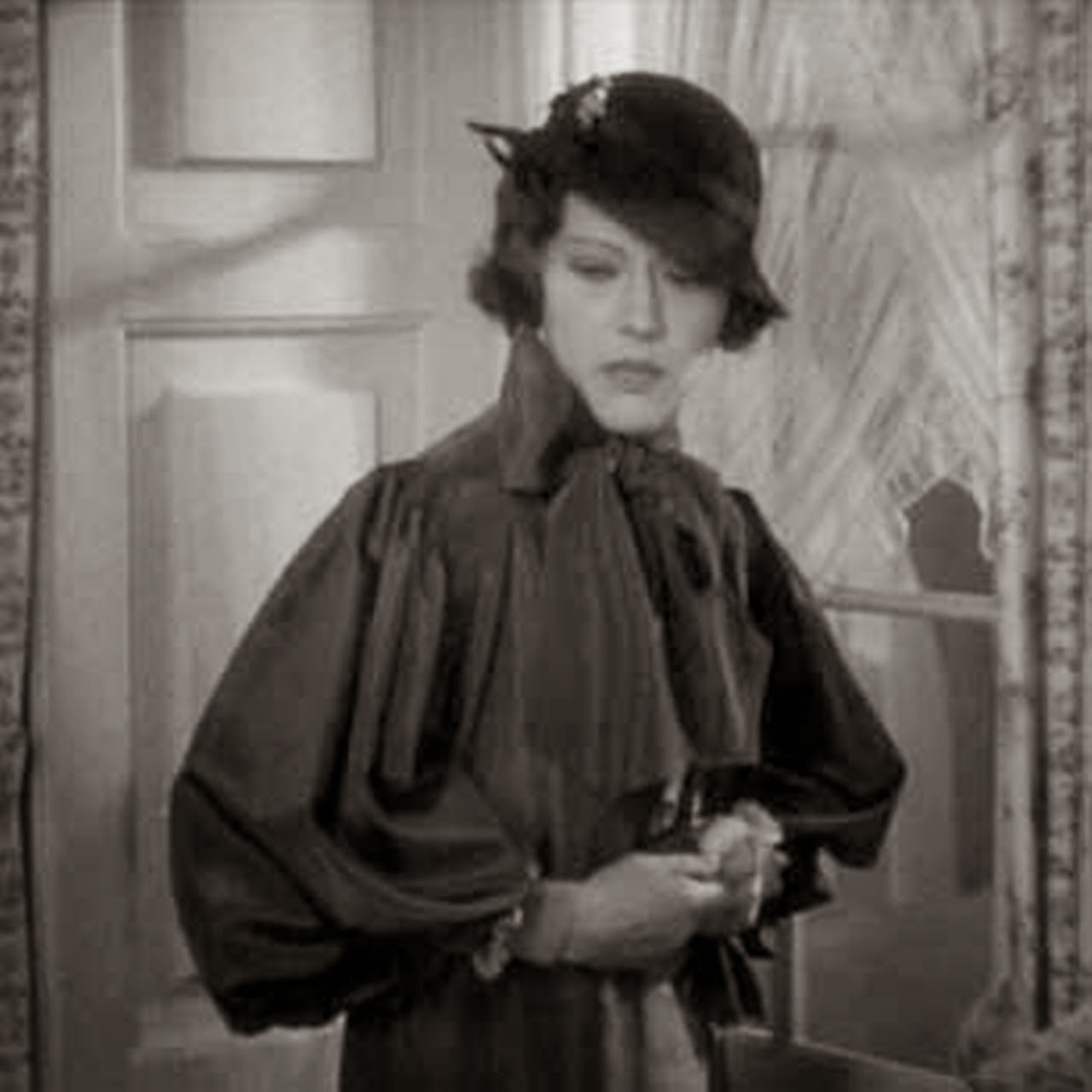












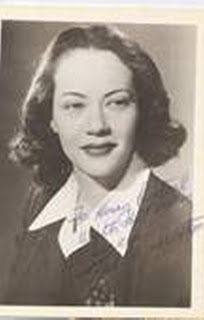











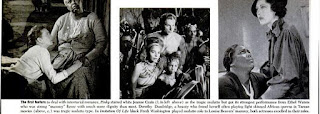













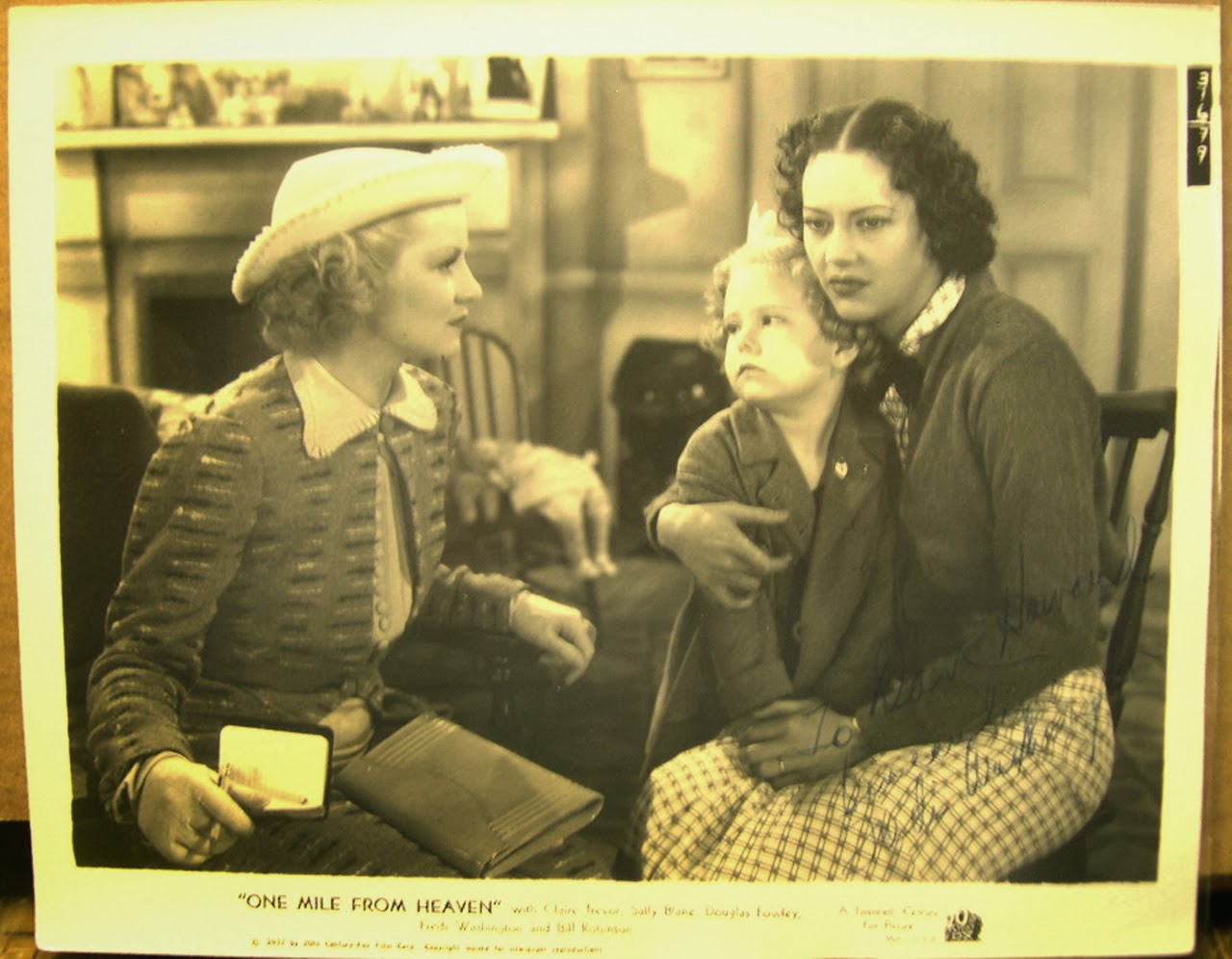





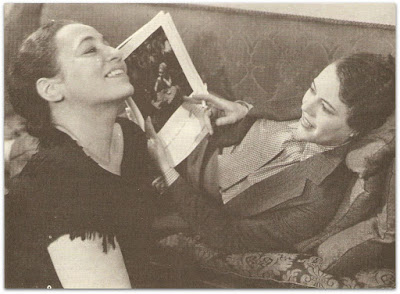












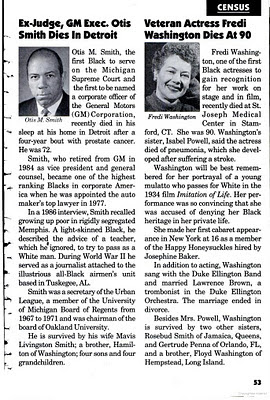




0 comments:
Post a Comment